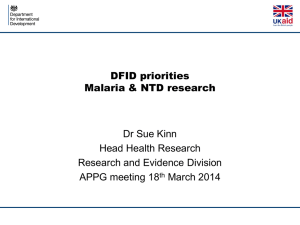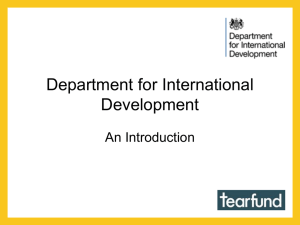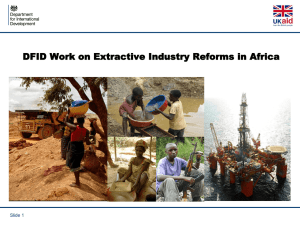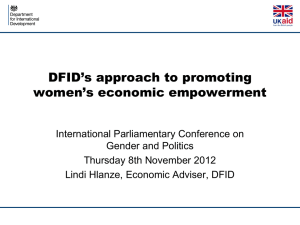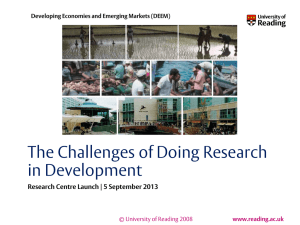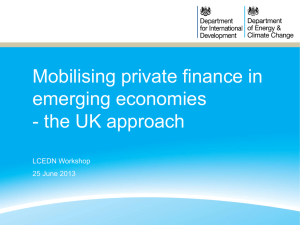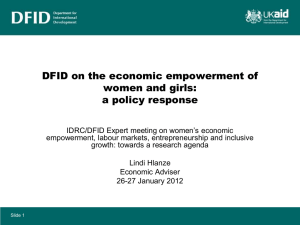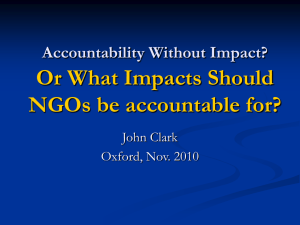outputs outcome impact - Department for International Development
advertisement
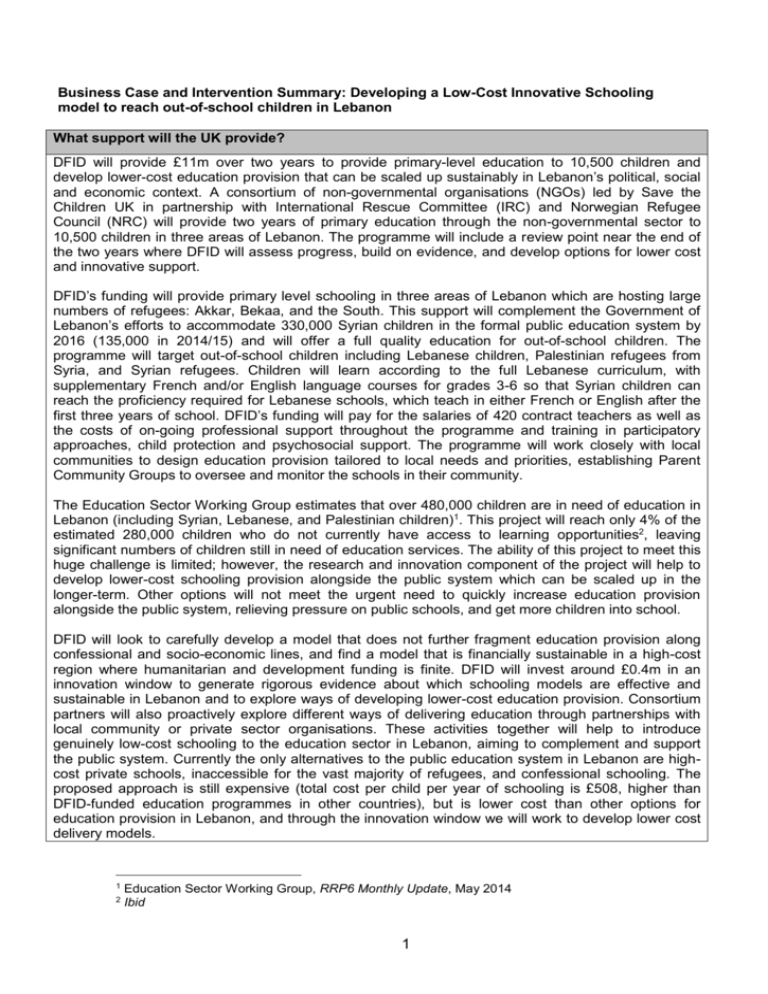
Business Case and Intervention Summary: Developing a Low-Cost Innovative Schooling model to reach out-of-school children in Lebanon What support will the UK provide? DFID will provide £11m over two years to provide primary-level education to 10,500 children and develop lower-cost education provision that can be scaled up sustainably in Lebanon’s political, social and economic context. A consortium of non-governmental organisations (NGOs) led by Save the Children UK in partnership with International Rescue Committee (IRC) and Norwegian Refugee Council (NRC) will provide two years of primary education through the non-governmental sector to 10,500 children in three areas of Lebanon. The programme will include a review point near the end of the two years where DFID will assess progress, build on evidence, and develop options for lower cost and innovative support. DFID’s funding will provide primary level schooling in three areas of Lebanon which are hosting large numbers of refugees: Akkar, Bekaa, and the South. This support will complement the Government of Lebanon’s efforts to accommodate 330,000 Syrian children in the formal public education system by 2016 (135,000 in 2014/15) and will offer a full quality education for out-of-school children. The programme will target out-of-school children including Lebanese children, Palestinian refugees from Syria, and Syrian refugees. Children will learn according to the full Lebanese curriculum, with supplementary French and/or English language courses for grades 3-6 so that Syrian children can reach the proficiency required for Lebanese schools, which teach in either French or English after the first three years of school. DFID’s funding will pay for the salaries of 420 contract teachers as well as the costs of on-going professional support throughout the programme and training in participatory approaches, child protection and psychosocial support. The programme will work closely with local communities to design education provision tailored to local needs and priorities, establishing Parent Community Groups to oversee and monitor the schools in their community. The Education Sector Working Group estimates that over 480,000 children are in need of education in Lebanon (including Syrian, Lebanese, and Palestinian children)1. This project will reach only 4% of the estimated 280,000 children who do not currently have access to learning opportunities2, leaving significant numbers of children still in need of education services. The ability of this project to meet this huge challenge is limited; however, the research and innovation component of the project will help to develop lower-cost schooling provision alongside the public system which can be scaled up in the longer-term. Other options will not meet the urgent need to quickly increase education provision alongside the public system, relieving pressure on public schools, and get more children into school. DFID will look to carefully develop a model that does not further fragment education provision along confessional and socio-economic lines, and find a model that is financially sustainable in a high-cost region where humanitarian and development funding is finite. DFID will invest around £0.4m in an innovation window to generate rigorous evidence about which schooling models are effective and sustainable in Lebanon and to explore ways of developing lower-cost education provision. Consortium partners will also proactively explore different ways of delivering education through partnerships with local community or private sector organisations. These activities together will help to introduce genuinely low-cost schooling to the education sector in Lebanon, aiming to complement and support the public system. Currently the only alternatives to the public education system in Lebanon are highcost private schools, inaccessible for the vast majority of refugees, and confessional schooling. The proposed approach is still expensive (total cost per child per year of schooling is £508, higher than DFID-funded education programmes in other countries), but is lower cost than other options for education provision in Lebanon, and through the innovation window we will work to develop lower cost delivery models. 1 2 Education Sector Working Group, RRP6 Monthly Update, May 2014 Ibid 1 Why is UK support required? Lebanon is in crisis, struggling to cope with the impacts of the Syrian crisis which has seen over a million refugees arrive in the country over the last three years. Many of these refugees are children and risk becoming a “lost generation”, their lives disrupted by the conflict, their future potential wasted and at risk of radicalisation. In Lebanon, the number of children out of school is continually increasing as more refugees arrive in the country. The UK is committed to supporting Lebanon’s education sector over the medium term for five years; DFID plans to support the national education system in a balanced way, delivering through two strands. The UK aims to support implementation of the Government of Lebanon’s “RACE-Lebanon” plan (Reaching all Children with Education in Lebanon) as well non-government alternatives to ensure more children can access education. Currently, approximately 30% of children in Lebanon are educated through the public system. The rest attend high-cost private or confessional-based schools. The Lebanese state has relatively weak capacity to deliver quality education services effectively and equitably to Lebanese children; although the current Government has risen to the unprecedented challenge of absorbing a huge number of refugees (creating 135,000 primary school places for the 2014/15 school year and aiming to accommodate a total of 330,000 children by 2016), public schools cannot absorb all the children in need of education in Lebanon. Significant numbers of refugee children will remain out of school; DFID’s intervention aims to establish an alternative low-cost model for education provision for 10,500 of these remaining children. This project will target children who are currently out of school and unable to be accommodated in the public system. DFID will focus on providing full quality schooling in line with the Millennium Development Goals, in contrast to the short-term provision of current alternative education programmes, and will bring in the private sector and community-based organisations to ensure the model is genuinely low-cost, innovative, and sustainable in the Lebanese context. International humanitarian funding is currently supporting forty-four organisations plus UN agencies to deliver temporary non-formal education programmes designed only for the immediate needs of newlyarrived refugee children (3-6 months). This is pro-rata an expensive, poor quality substitute for a full education, and Syrian parents are concerned that their children are missing out on crucial exams. There is an urgent need for a full quality education model that works alongside the public education system to help more children access education. UK support will target this gap. What are the expected results? This Business Case sets out the results and intended activities over two years, although Year 2 funding will be conditional on project performance against the logframe in Year 1 of implementation: OUTPUTS OUTCOME IMPACT Children access quality, safe nongovernmental schools. Increased schooling provision in Lebanon’s national education system Learning spaces are set up Teachers are recruited and trained to deliver quality education and help conflict-affected children learn Communities are mobilised to engage with and oversee education delivery Innovative schooling model is developed 2 The following headline results will be achieved: 10,500 children will receive a full two years of primary-level education, attending school for 5 hours each day including supplementary English and/or French language training3 420 teachers will receive five days of initial intensive training as well as two days of in-service training, and psychosocial professional support 10,500 children will receive learning materials including books High quality data, evidence, operational research and evaluation products will be disseminated to national and international stakeholders to support evidence based scale-up of a low-cost schooling model Strategic Case A. Context and need for a DFID intervention Lebanon is in crisis, facing increasing levels of instability and violence as a result of regional and domestic conflicts. DFID is committed to supporting Lebanese stability and helping the Government of Lebanon to cope with the impacts of the Syrian crisis over the medium term, as the conflict in Syria continues and Lebanon faces a protracted refugee crisis. This project aims to support the Government of Lebanon in its efforts to provide education for Syrian refugee children. As highlighted by the No Lost Generation Initiative, large numbers of children across the region are currently unable to access education. In Lebanon there are currently over 360,000 registered schoolage (3-17 years) refugee children4, with new refugees continuing to arrive every day. Most refugee children are not in school. This increases their vulnerability to protection risks, including violence, radicalisation, recruitment to fight, forced/early marriage, exploitation and child labour and risks creating a “lost generation” of children without skills and future employment. Ensuring children can access quality education in safe environments helps to mitigate protection risks as well as enabling them to fulfil their potential and contribute to society as adults, whether in host countries or on return to Syria. The RACE-Lebanon plan formulated by the Government of Lebanon and UNICEF focuses on improving access, teacher performance and learning outcomes, and strengthening the national education system. The plan identifies two main entry points for support to education in Lebanon: expanding the capacity of the public sector to accommodate Syrian children, and providing alternative learning opportunities for those children who are unable to access education through the public sector. DFID will support both the public and the non-governmental education sectors in Lebanon over the next five years to ensure as many children as possible can access primary education. The project aims to increase the numbers of children accessing education and relieve pressure on the primary public school system. While the public school system is accommodating as many refugee children as possible, it is under pressure: parents believe learning outcomes have been negatively affected, drop-out rates among vulnerable Lebanese children have risen5, and teachers feel illequipped to support conflict-affected children from a different education curriculum and medium of instruction. Despite the implementation of the “second shift” system in many primary schools, the formal education system is unable to absorb all refugee children in need of education: the number of school-age refugee children in Lebanon is greater than total number of children enrolled in public schools before the crisis6. 3 A full year of schooling means children attend school for 30 weeks. This allows for phased roll-out during the initial months of implementation. 4 UNHCR, Registration Trends for Syrians in Lebanon, 30 June 2014 5 UNICEF and Save the Children, Education rapid needs assessment for displaced Syrian children in schools, community and safe spaces, 2012 6 RACE-LEBANON, Version 5 March 2014 3 The Regional Response Plan VI (RRP6) education component is relatively well-funded compared to other sectors of the emergency response, at 41%. The European Commission is currently the main agency financing education service delivery in public schools (60m Euros channelled through UNHCR and UNICEF), while other donors are providing humanitarian funding for short term nonformal education which is only designed to prepare new refugee arrivals for entry into the formal education system. There are also a number of “development” programmes pre-dating the crisis: United States ($75m), France ($64m), World Bank ($40m loan) and the European Commission ($22m). There is an urgent need for DFID to support full quality education for out-of-school children which is not currently being funded by other donors. This project will target a gap in support to date by targeting those who cannot be accommodated by the public system and providing a structured, full curriculum. The project will reach 4.6% of the RRP6 target for children enrolled in nongovernmental education programmes (225,000) and 8.4% of the teachers targeted to benefit from training and capacity building (5,000), and will contribute 10% of the total funding requested for the Education Sector response in 2014 ($182m). The proposed activities align with DFID’s emerging strategy for Lebanon, which includes a strong cross-cutting focus on the No Lost Generation Initiative with support for protection and psychosocial services. In line with the requirements of the International Development (Gender Equality) Act 2014, the NGO Consortium are considering how the differing needs of boys and girls should be taken into account in programme design. Further detail is set out below. DFID is already funding all three delivery partners to provide emergency humanitarian assistance in Lebanon in different sectors, not including education. B. Impact and Outcome that we expect to achieve Impact: increased schooling provision in Lebanon’s national education system Outcome: children access quality, safe non-governmental schools Output indicators include the number of learning spaces set up (including renting and/or renovating existing buildings) and equipped to provide safe learning spaces, the number of contract teachers recruited, trained and supported to help children affected by conflict learn, establishment of a robust learning assessment to measure student learning standards, and measures of community engagement with the consortium’s approach. Taken together these indicators will assess progress towards the outcome by tracking the establishment of safe, high-quality learning spaces with the participation of teachers and local communities. DFID will also track the consortium’s activities aimed at developing more innovative schooling models, such as partnering with local private sector or community organisations. Appraisal Case A. What are the feasible options that address the need set out in the Strategic case? The Appraisal Case compares four options to increase access to education in Lebanon: 1. Do nothing – DFID provides no additional funding to support education in Lebanon. 2. Long-term education sector support – DFID provides £11m over two years to a long-term financing facility to design and deliver interventions supporting the RACE-Lebanon plan 3. Existing short-term programmes – DFID provides £11m over two years to support existing programmes supporting the public education system and/or non-formal learning 4. Non-governmental provision delivered by a consortium of NGOs – DFID provides £11m over two years to non-governmental actors to provide primary-level education alongside the public system 4 B. Costs and benefits 1. Do nothing If DFID provides no additional education funding (to either public or non-governmental sectors), 140,000 Syrian refugee children will continue to be accommodated in the public education system7. We assume that other donors will continue to fund some education activity, helping to cover the costs of the second shift for a number of refugee children and also providing some short-term alternative education programmes. However, as discussed above, the second shift will not be able to accommodate all out-of-school children in Lebanon; the Education Sector Working Group estimates that there are currently over 280,000 children without access to any form of education. These children will be left vulnerable to protection risks such as exploitation or child labour. 2. Long-term education sector support To increase the number of children accessing education during the 2014/15 school year, DFID could contribute £11m to a long-term financing facility which will design and implement interventions to support the national education system. There is a clear and urgent need to support the formal public education system to absorb increasing numbers of students. DFID is exploring options for providing long-term predictable finance for this purpose, enabling the Ministry of Education to invest in school infrastructure, additional teachers, and other necessary support. However, options for a long-term financing facility to support the formal education system are still in development. Although work is underway to expand capacity of the public education system, it is unlikely that public schools will be able to accommodate all school-age Syrian children in the medium term. The RACELebanon plan notes that a number of complementary delivery options will be needed to ensure all children in Lebanon can access education. For this reason DFID plans to invest in both expanding the formal public sector and alternative non-governmental delivery, maximising the options available for getting children into school. 3. Existing short-term programmes DFID’s funding could be used to expand current programmes delivered by UNICEF or UNHCR which are helping children access education. i) The GoL has set a unit cost of $450 (£264) per child for the second shift, but this does not include implementers’ programme support costs or additional costs for transportation, equipment, etc. Agencies report that the full cost per child is around $1000 when additional costs are taken into account. At a unit cost per child per year of $1000, by funding the second shift through UNICEF or UNHCR DFID could reach 9,300 children for two years. An estimated 271,000 children would remain without access to any education opportunities. Funding UNICEF or UNHCR to enrol children in the second shift would help to increase the numbers of children accessing education in Lebanon. However, as discussed above, the public sector has limited capacity to absorb all out-of-school children; DFID also needs to support alternative options to ensure all children are able to access education. Investing in the development of low-cost non-governmental schooling models will relieve pressure on the public system and help to build capacity in the Lebanese education system. 7 Education Sector Working Group, RRP6 Monthly Update, May 2014 5 ii) UNICEF is already implementing a number of basic non-formal education programmes in partnership with a range of NGOs, including Accelerated Learning Programmes. DFID could increase the numbers of children accessing basic non-formal learning opportunities during the 2014/15 school year by funding UNICEF to scale up its existing programmes. The unit cost per child per year for these short-term education programmes is significantly higher than the unit cost for the proposed model, at $1050 compared with $860. This is based on an estimated cost of $350 for a ten-week course8. This option would help to quickly increase the numbers of children accessing education outside the public system, reaching an estimated 26,000 children, and therefore could meet the need identified in the strategic case. However, existing short-term emergency education programmes do not provide full schooling or accreditation, and therefore it is likely that they will be less effective in improving learning outcomes for children than structured, full curriculum provision; also, feedback from beneficiaries indicates that Syrian parents are concerned by the lack of formal accreditation as this is essential for educational progression. Although more children could be reached by funding existing non-formal education programmes, those children would not receive a full-quality education in line with the Millennium Development Goals. 4. Non-governmental provision delivered by a consortium of NGOs DFID’s funding could be used to provide basic education outside of the public system and develop a lowercost, innovative model delivered by NGOs, community organisations, and the private sector. This would target a key gap in provision by providing a full, quality education at primary level outside of the government sector. DFID will require partners to look to develop partnerships with local private sector and charitable organisations to build local capacity and ensure the model is sustainable. However, to quickly increase education provision to complement the public system and get more children into school, the consortium represents the only viable option. This project would provide education opportunities for 4% of the estimated 280,000 children who are currently unable to access any form of education. Low cost innovative schooling does not currently exist in Lebanon: the sector is split between public provision (30%), confessional schools, or high-cost private schools. However, there is evidence from other countries that the private sector can help to deliver low-cost education if opportunities exist. DFID recognises that the proposed delivery model is expensive, but it represents an opportunity to develop lower-cost models through innovation and partnerships with private or community-based organisations. This will help to introduce genuinely low-cost schooling models to the education sector in Lebanon, helping to develop sustainable education provision which will complement and support the public system. This option will deliver two years of full quality primary-level education to an estimated 10,500 children at primary level (grades 1-6) in Akkar, Bekaa, and the South. Funding will pay for the salaries of an estimated 420 teachers, learning materials, teacher training and support, as well as the costs of NGO programme support. The proposed approach involves establishing and supporting Parent Community Groups to develop schooling models that reflect community priorities, and engaging parents and members of the community to strengthen community networks. The project will build the capacity of local teachers, parents and community leaders to improve education provision in their area, helping to strengthen the Lebanese education system over the longer term. Each partner has an established presence in different areas of Lebanon: Save the Children will implement in Akkar, IRC will work in the Bekaa, and NRC will work in the South. Implementation will be managed by a dedicated Programme Management Unit reporting to Save the Children. The unit cost per child is £508 ($860). This approach is expensive, reflecting significant programme support costs of delivering through international NGOs. The unit cost also reflects the high costs of teacher salaries (30% of total programme budget); this are set by the Government of Lebanon and is the same for 8 Children attend school for 30 weeks during each full year of education. 6 all types of education provision. Although the consortium will look to employ Syrian teachers on a stipend to reduce salary costs, this is a highly contentious political issue in Lebanon and it is likely salary costs will remain high over the life of the programme. A key driver of programme support costs is the additional staffing required to deliver the programme. DFID is supportive of delivery partners’ need to build capacity, especially for delivery of a complex programme requiring significant flexibility during implementation. However, we also recognise that such high programme support costs are not sustainable. Throughout the programme DFID will work closely with partners to explore, develop and test innovative partnerships with private sector, charitable or communitybased organisations to leverage additional resources. Securing funding and support from other sources will help to make the approach more sustainable by integrating this approach into the Lebanese education sector. Summary of costs and benefits: Option Do Nothing Finance Unit cost per child per year Results £0 - Sustainability Ability deliver to Long term education sector support £11m TBC Existing programmes No increase in number of children accessing any form of education TBC - interventions at early stages of programme development 280,000 children remain unable to access education N/A Public education system supported to accommodate additional students; MEHE capacity strengthened World Bank Trust Fund is well positioned to develop sustainable public education support but may take six months to reach implementation - 9,300 more children receive 2 years of second-shift schooling OR - 26,000 more children receive 2-3 months of non-formal education Short-term/ad hoc provision does not strengthen education sector overall; lack of coordination; no capacity building UNICEF/UNHCR have been the first providers for public education support, but UNHCR is exiting the sector; capacity to deliver shortterm programmes £11m $1000 or $1050 Community-based education £11m $860 - 10,500 more children receive 2 years of full quality primary education - Children attend school for 5 hours per day Systematic approach coordinated by partners; long-term benefits due to teacher training, community ownership and partnerships with local organisations Consortium partners are well established across Lebanon, and have successfully delivered humanitarian programmes previously; strong track record on delivering quality education in other conflictaffected contexts Theory of change: An indicative logframe, including a set of proposed indicators, is included at Annex A. This will be worked on in more detail during implementation. 7 RISK MANAGEMENT ASSUMPTIONS Entrepreneurial private sector and tradition of community/charity engagement means that additional resources are Increased schooling provision in Lebanon’s national education system Impact available Programme looks for opportunities to partner with private sector/charitable organisations Communities and the Lebanese Government and private sector engage positively with the approach Outcome Children access quality, safe non-governmental schools Government of Lebanon permits and encourages public sector teachers to engage with the programme Parents and communities are willing to participate in oversight of education; communities willing to provide learning spaces Teachers are supported to help conflict-affected children learn effectively through training and professional psychosocial support Project management is effective Security situation remains stable to enable continued delivery Policy dialogue with Government of Lebanon Early engagement with communities and parents Learning Innovative schooling model is developed spaces are set up Outputs Teachers recruited and trained to deliver quality education and help conflict-affected children learn Communities mobilised to engage with and oversee education delivery Continuous monitoring of security situation SCF + NRC + IRC operations + innovation window Programme feedback and reporting DFID Input: £11m; advisers and management Other donor inputs 8 Year 2 funding disbursed based on performance against logframe C. Strength of the evidence base Evidence rating Weak This programme represents a high-risk innovation, developing new lower-cost models of schooling to meet the unprecedented challenge of absorbing Syrian refugees into a fragmented national education system, where public education is the last resort for the poorest. This is also a new country operating context for DFID, and a more comprehensive understanding of the education sector needs to be developed. As such it is essential that the programme invests in generating high-quality evidence on how low-cost innovative schooling models work in Lebanon’s context. It is also essential that research is conducted and data analysed on how public, private and non-governmental education provision interact with each other in terms of teacher incentives, student demand, and costs and quality of different types of provision. DFID will invest around £0.4m in an innovation window to generate rigorous evidence about which low-cost schooling models are effective and sustainable in Lebanon’s national education system. This will finance high quality data analysis, operational research, and work to leverage private sector resources for this programme. This will build on lessons from DFID’s pioneering work on Low Cost Private Schools in Pakistan and Nigeria, as well as extensive experience of Community Based Education models subsidised by DFID and other donors in Afghanistan (the Girls Education Challenge), Ghana and Bangladesh. There is some evidence from other countries that new models of schooling can be introduced effectively to national education systems. For example, low-cost private schools have expanded rapidly in Latin America, Africa and South Asia over the last fifteen years. In some contexts, governments and donors have created public-private partnerships to expand private sector capacity under Government regulation. The most successful of these examples is the Punjab Education Foundation supported by DFID, the World Bank and the Government of Punjab, reaching one million children. A rigorous impact evaluation9 demonstrated that this is one of the world’s most cost-effective interventions. However, the evaluation also found that the programme was encouraging children to migrate from public schools, so no net enrolment gains were achieved. The second phase of the programme is testing the effects of private school vouchers and improved beneficiary targeting to reach genuinely out-of-school children. The existing evidence on low-cost private schools is not replicable in Lebanon, as the education system is based primarily around high-cost private schooling. However, new and unpublished research by the Centre for Lebanese Studies has identified new trends in Syrian refugees accessing both private schools and religious schools. Anecdotal reports suggest that, where refugees have assets, they may be paying school fees; private schools are finding ways to adapt their business model by setting up parallel shifts for Syrian refugees. Work by the World Bank in Sindh Province demonstrated that it is possible to create new models of low-cost schooling where they did not previously exist through partnerships with the private sector10. Anecdotal reports also indicate a potential inflow of private funding from the region for refugees to attend religious schools. All of this points to the urgent need for DFID to engage strategically to understand the unmapped proliferation of non-governmental provision in Lebanon. With good evidence it will be possible to harness a wider range of financial and human resources in Lebanon, helping to get all children into school despite finite government and international funding. 9 Raju, D. and Barrera-Osorio, F., "Short-run learning dynamics under a test-based accountability system : evidence from Pakistan”, Policy Research Working Paper Series 5465, World Bank, 2010 10 “Expanding education opportunity in remote parts of the world: evidence from an RCT of a PublicPrivate Partnership in Pakistan”, Barrera-Osorio, F., Blakeslee, D. S., Hoover, M., Linden, L., Raju, D., 2011; “Alleviating constraints to unlock the full growth potential of Pakistan’s education entrepreneurs serving the rural poor”, LEAPS team (unpublished), 2011 9 The community-based education model has been successful in increasing access to education, girls’ participation and learning outcomes in other countries11. However, the model is alien to Lebanon’s national education system and unknown in the Middle East region. It has worked best in rural contexts where communities have little income but can share assets (such as labour or a space for learning) but Lebanon is 90% urban and Syrian parents have little tradition of engagement in schools through Parent Community Groups. The community-based education model is low-cost in African and South Asian contexts where teacher salaries are low; frequently, teachers are paid below public sector wage rates, whereas in Lebanon all contract teachers must be paid a standard rate. The community-based education financial model is usually dependent on long-term parallel funding from donors. DFID wants to help build a model that can be sustained beyond donor funding, with national government, private sector and community resources. This programme offers a platform to test options for delivering a financially and politically sustainable model in the long term; an assessment at the end of the two years will provide evidence for further DFID and other donor investment in the sector and optimally some form of public-private partnerships led by the Government of Lebanon. D. Equity Overall rating Medium The consortium have provided information, based on their assessments of the situation of refugees in Lebanon and their experience providing education in conflict-affected contexts, about how the differing needs of boys and girls have been taken into account in programme design. Equity measures are inbuilt in the design of the programme, which will ensure equitable access for the most marginalised children who would otherwise be excluded from education. Situating learning spaces in the community will ensure that children do not need to travel to areas outside their communities to access education - a particular security concern for girls and their parents – so girls are more likely to be able to attend. Similarly, communities will identify appropriate school hours that can be timetabled around work commitments: older boys are often required to work, so a flexible approach designed around community needs will help to ensure boys do not face work-related barriers to education. The consortium plan to target girls and boys equally, but taking into account various different barriers for girls’ and boys’ access. Education provided by the programme will be available to all out of school children that meet the agreed criteria. This will include Syrian refugees, Palestinian refugees from Syria, and vulnerable Lebanese children. Clear selection criteria will be developed, and presented and agreed with the community so there is full transparency in the process. Where out-of-school children do not meet the criteria they will, wherever possible, be linked with or directed to other programmes. Extenuating circumstances will be taken into account and agreed with the community. Parent Community Groups (PCGs) will be elected by the communities themselves. The selection process and membership requirements for the PCGs will incorporate gender sensitive and conflict sensitive components, ensuring that all interest groups are represented in the PCGs and have a voice in the management/oversight of project activities. The incorporation of French or English teaching (with additional language training for grades 3-6) will help to facilitate integration of refugees into the trilingual education curriculum and system. The curriculum, materials and teaching will comply with Government policy and regulations and inspections. The programme will ensure safety in schools and that schools are free from violence. Child protection and DeStefano, Schuh Moore, Balwanz and Hartwell, “Reaching the Underserved: Complementary Models of Effective Schooling”, 2007 11 10 child safeguarding mechanisms will be put in place. Principles of tolerance and inclusion of all learners will be an integral part of Codes of Conducts in learning sites. Teachers will receive pre-service and in-service training and support on instructional and classroom practices that promote students’ social and emotional well-being and learning. Training provided to teachers over the programme implementation period will include reinforced teaching skills, multi-grade teaching, participatory approaches, positive discipline and psychosocial support in the classroom, child safeguarding and child protection, referral mechanisms to provide additional support, and creation and use of teaching aids using locally-available materials, equipping them with skills to meet the learning and psychosocial needs of a range of children. The programme’s approach aligns with the concept of Healing Classrooms and similar tools/approaches developed by Save the Children and NRC, expanding and supporting the ways in which teachers can create and maintain ‘healing’ learning spaces in which all children can recover, grow and develop. Healing Classrooms: are designed to strengthen the role that schools and teachers play in promoting the psychosocial recovery, well-being and social and emotional learning of children and youth; recognises the importance of understanding teachers’ experiences, motivation, well-being and priorities to ensure meaningful and relevant support and training; and focuses on supporting teachers to play a positive role during and after crises. The staff recruitment process will be guided by the Save the Children’s diversity, equity and equality policy. This will ensure that where possible there is a good mix and balance of equally competent people from all sides of the conflict and host communities without bias or favour who support the programme, including staff, teachers, and parents/community members. As the programme develops, Save the Children and consortium partners will engage with all interested stakeholders to ensure the programme is responding to needs and to promote a sense of inclusion and ownership. The Consortium will continue to assess the conflict dynamics and its shifting nature in the refugee and host communities and in the wider political context through programme implementation. The review points at the end of each year will provide an additional opportunity to consider in detail the conflict sensitivity of the programme and its effect on local-level conflict. E. Likely impact on climate change and environment The likely negative impact from this project on climate change and environment is low; the impacts associated with teaching, training and the procurement of books and classroom equipment are relatively low. There is an opportunity to integrate environmental awareness in the syllabus and in teacher training. For example, key issues for displaced people in Lebanon include water scarcity, indoor air pollution from poor cook-stoves, and waste management. Raising awareness of the risks associated with these issues and ways in which risks could be mitigated would give the educational programme added value. Tents where necessary, will need to be imported and will degrade over time. They may be the only option, though, in some locations. The programme will seek to use existing structures or tents as feasible. The renovation of spaces will have a positive impact on the environment, improving unfinished or damaged buildings. Wherever possible we will use local materials. The programme will use existing buildings wherever possible. Textbooks will be printed in country, and will be used for more than one year wherever possible. Stationery and classroom/teacher kits will be purchased in Lebanon rather than being imported, reducing emissions from transportation. Vehicles – the programme will aim to use newer models, reducing emissions and negative impact on the environment; movements will be planned accordingly to ensure that vehicles are use in the 11 most efficient and environmental friendly manner. The programme will reuse outreach and teacher training materials wherever possible, reducing use of natural resources. At the end of the programme, any remaining materials that cannot be used by other programmes will be disposed of appropriately. I. Value for Money assessment for the intervention The total cost per child per year of schooling is £508, including all programme overheads and staffing costs and delivering five hours’ structured learning per day. This is well above the DFID range of £16 - £142 per child in priority countries. However, as discussed in the Appraisal Case above, this approach is lower-cost than other options in Lebanon. The key cost drivers are teacher salary scales in a Middle Income Country and NGO programme costs. The budget clearly identifies output indicator costs. The direct output cost of delivering education is £297 ($496) per child per year, which is significantly higher than DFID’s usual range – reflecting higher costs for teachers, learning spaces, and learning materials. DFID will track unit costs and other value for money indicators throughout the programme through the Delivery Plan and Annual Review. An indicative budget for programme delivery is included below – this will be revised during the Inception Phase as DFID staff work with Save the Children to identify further efficiencies: Description Cost Safe LCIS spaces established 1,804,205 17% Teachers recruited and trained to deliver education 4,355,508 41% Parents and communities mobilised 64,911 1% Strengthened sector coordination 24,027 1% 1,443,109 14% 143,350 1% 88,413 1% Office Running Costs 374,275 3% Senior Management 249,888 2% Support Staff 605,699 6% Security and Logistics 554,861 5% Internal Cost Recovery 970,825 9% 10,679,070 100% Programme and PMU Staffing International Technical Support Equipment and Logistics TOTAL % of total budget Output costs 1. Teachers’ salaries are set by the Government of Lebanon at a rate of $10 per 45 min lesson. The consortium will look to increase the teacher: pupil ratio above 1:25 where possible, thus reducing the total number of teachers needed, and to employ volunteer Syrian teachers on stipends if MEHE grants permission. These measures will help to drive down costs, but it is likely salary costs will remain high. The consortium will also look to identify cost savings through innovating local private sector, community or charitable organisations on the schooling model. The innovation component of the programme will be tracked through the logframe. 2. The total cost of renovating/renting spaces will be determined during the Inception Phase. The consortium has considered a range of “gateways” for providing opportunities for learning spaces, and will seek to maximise the use of free or less expensive options (e.g. community members’ homes, vacant or shared community spaces, disused buildings) to reduce costs. The consortium considered only targeting communities where a low-cost space is already available, but this would 12 significantly restrict the programme’s ability to reach the most vulnerable out of school children. The consortium will start discussions with communities as early as possible to identify available low-cost spaces and minimise costs. Programme administration and management costs 1. The size of the Programme Management Unit has been significantly reduced to fit with the scale of the programme, recognising that partners will incorporate some programme management activities into their own field office structures. However, the PMU needs to retain core management and oversight functions to oversee effective delivery, ensure coherence across the three partners, and engage proactively with coordination mechanisms at national level. Other programme staff costs represent a much larger share of the total budget, as partners need to scale up their capacity to deliver this programme. 2. DFID will work with Save the Children (consortium leaders) to further reduce programme overheads before agreeing the final budget and disbursing funding. Effectiveness Key measures of effectiveness will include availability and quality of education provision, teacher performance, and the development of a robust learning assessment to measure student learning standards in the context of conflict and displacement. The programme’s monitoring framework is based on frontline monitoring by Parent Community Groups, supported by field office staff. Year 2 funding for this programme will be conditional on satisfactory performance against the indicators set out in the logframe: DFID will agree realistic milestones based on the consortium’s detailed workplan, which includes an Inception Phase to work through a number of implementation details. After the Inception Phase the consortium will revise implementation plans based on their preparatory work. This programme offers a testing period to adapt the approach in response to Government of Lebanon policies and strategic vision for the national education system, ability to leverage private sector resources, delivery conditions on the ground, level of engagement of communities, and beneficiary feedback. DFID will require the consortium to look to partner with charitable, community and private sector organisations to innovate within the programme and test different approaches; this will provide an evidence base to support DFID’s decision-making about further investment in non-formal education in Lebanon. Commercial Case Delivery through a third party entity A. Why is the proposed funding mechanism/form of arrangement the right one for this intervention, with this development partner? A competitive procurement process was not a viable option, due to the urgent need to start implementation in a short timescale (close to the start of the school year in September). DFID has limited knowledge of the private and public sector markets in Lebanon and it is unclear how suppliers would have responded. A competitive procurement process would have only allowed DFID to increase the numbers of children in school in 2015/16. Direct procurement is therefore not part of the programme; DFID received a proposal from the consortium and did not issue a call for proposals. The consortium have significant experience delivering education in other conflict-affected contexts. Funds will be disbursed to Save the Children (SCF) through an Accountable Grant. This is a directly accountable mechanism for funding development partners. Payments will be made to Save the Children as the lead NGO in the consortium, and all financial and activity reporting to DFID will be 13 carried out by Save the Children. Payments will be made quarterly in advance set against clear deliverables to be achieved in that period. The Accountable Grant arrangement enables clear lines of accountability between DFID and the consortium partners; DFID will disburse funding to SCF through the Accountable Grant arrangements, and SCF will be solely responsible to DFID for delivery of the programme. SCF will sub-contract consortium partners and will be responsible for management of partner performance. The contracting arrangements will include a clear break clause after Year 1 to drive efficiency and delivery. Year 2 funding will be conditional on a satisfactory review of the consortium’s delivery against logframe indicators. DFID will monitor progress carefully and, if necessary, consider alternative arrangements for ensuring children enrolled in the programme remain in education. An end-of-programme review by both DFID and the consortium partners will assess options for expanding or adapting the programme, using evidence gathered during implementation. The partners will establish a dedicated Programme Management Unit (PMU), which will manage the programme and oversee delivery. Although delivery partners will incorporate some aspects of programme management into their own country- and field-level structures, funding (approximately £415,000) is required to set up the PMU, including staffing and equipment costs. This represents 3.9% of the total programme budget. The PMU will ensure coherence and coordination across the three delivery partners, and act as a single point of contact for engagement with the Government of Lebanon. This will improve coordination across the sector in Lebanon and help to increase accountability to Government. For DFID, the benefits of delivering through a consortium lie in the reduced costs of programme management (compared with managing three separate projects). DFID has considered separate support to the three NGO partners as an alternative delivery option. This would mean removing the PMU and managing funding allocations separately to each partner, with separate accounting and reporting structures. Overall, however, the PMU is not a significant cost driver; other programme staff and technical support represent a far larger share of the total programme budget (around 11%), as well as general running costs. If DFID chose to support each partner separately these costs would still be incurred. A review of other DFID-funded programmes delivered by these partners in Lebanon shows programme support costs (including staff) of up to 40% of the total programme budget. Programme support costs for the proposed approach, including the PMU, are 41%. It is unlikely that programme overheads could be significantly reduced by funding each partner separately. B. Value for money through procurement The consortium will procure materials and equipment from local suppliers, negotiating jointly to ensure maximum negotiating power but purchasing independently. This will ensure the consortium secure the best price for goods while spreading supply risk across a number of procurement contracts. The consortium will also seek to employ Syrian teachers on stipends rather than formal salaried contracts to reduce the total cost of teacher salaries. Financial Case A. What are the costs, how are they profiled and how will you ensure accurate forecasting? Q2 £1.07m 14/15 £5m Q3 £1.42m 15/16 £5m Q4 £1.38m Q1 £1.53m Q2 £1.19m 14 Q3 £1.33m Q4 £1.33m 16/17 £1m Q1 £1.4m Funding for the second year of the programme (Q2 15/16 to Q1 16/17) will be contingent on a satisfactory review of project delivery in 14/15. Save the Children have requested DFID’s agreement to provide advance funding for the programme. Costs are forecast according to the consortium’s expected cash flow and will be revised after Inception to ensure accuracy of forecasting. B. Funding by Proposal The Syria Crisis Unit is planning for a budget of £250m for the Syria humanitarian response in Financial Year 2014/15. The Unit has included £5m per year for education in its plans for Lebanon – funding for the NGO consortium project will come from this budget. Investment in education has been included in the latest draft of the Lebanon Country Plan, which proposes a cross-cutting focus on the No Lost Generation Initiative including protection and psychosocial services. C. Payment of funds Payment will be made in the form of an Accountable Grant to Save the Children. SCF will then allocate funding to consortium partners through its sub-grant agreements. SCF will be accountable to DFID for all funds. D. Assessment of financial risk and fraud Financial loss and fraud: As with many projects of this kind, there are risks of financial loss, fraud and collusion by communities, teachers and/or field staff. This section details the risks, the mitigating actions planned for by project staff, and the central and country policies and procedures in place. Within the Programme Management Unit (PMU), an internal audit unit will have oversight and be responsible for monitoring field activities on an ongoing basis and investigating any suspected cases of collusion. This will include quarterly monitoring visits that will be conducted with beneficiaries and the wider community. In a recent due diligence assessment (KPMG, 2011) and Annual Review, it was found that SCF had solid and well-established internal whistle-blowing, bribery and corruption policies and procedures in place to avoid staff being compromised in any situation of attempted fraud or corruption. Procedures included the use of a Risk Evaluation Tool that covers risk management, mitigation and escalation processes at programme level. SCF policy explicitly states that they will alert funders immediately if fraud, or potential fraud cases, are identified and will outline mitigation activities with the relevant funder. This is in line with DFID’s zero tolerance policy for financial risk and fraud, which requires that DFID is immediately notified if there is reason to believe DFID funds or supplies have been lost, damaged or unaccounted for. We will continue to inform SCF of this zero tolerance policy. While overall SCF policies and procedures were identified as well-established, it was noted in the due diligence assessment that these could be more consistently implemented within country and adapted to accommodate local capacity and customs. Measures to strengthen this are addressed within the attached due diligence assessment. Due Diligence: A due diligence assessment for Save the Children was recently conducted (KPMG 2011) to assess the organisation as a whole. This has since been updated with a desk-based due diligence assessment of the Syria Humanitarian programme and findings from the Save the Children Annual Review (20132104). In accordance with the Due Diligence methodology and assessment framework, SCF systems 15 and processes received an Amber/Green rating indicating that SCF are meeting most of DFID due diligence requirements but there are some areas needing additional support and oversight. In a meeting with Save the Children HQ in June 2014, SCF provided further information about how they were strengthening these areas to meet DFID standards. The table below summarises the main strengths and areas requiring additional support or exploration, with particular focus on Save the Children’s work in Lebanon and the implications for this project: Focus Region Strengths Strong relationship with implementing partners on the ground From the evidence reviewed SCF have strong working relationships with local delivery partners. SCF are working with partners to improve operational coordination by initiating an NGO cooperation forum for interventions based in Egypt. Requiring Additional Support/Exploration Governance – risk management Country offices must act in compliance with all centralised policies and procedures. However, as no variations in levels of risk were reported this indicates a need to strengthen documentation received Financial Stability SCF regional admin costs are higher than standard. Admin costs within regional programmes also vary and could require further exploration by DFID to ensure we are receiving value for money This is reflected in the Save the Children Annual Review which scored C for Value for Money. Monitoring In compliance with central processes SCF provide regular quarterly reporting on financial, results and impact to DFID. DFID have raised concerns regarding the suitability, consistency and robustness of aspects of the programme reporting data received from SCF. The level and nature of concerns raised by DFID colleagues on reporting material suggests the need for further targeted capacity building activities. Lebanon However, in the Annual Review, Save the Children were rated A for their Monitoring and Evaluation. It was noted that "the Q1 report was of poor quality and required much corrective feedback. DFID had a discussion with SCF London to give feedback. The Q2 report has borne this feedback in mind and is of much higher quality” Beneficiary feedback Feedback from DFID Humanitarian Advisers suggests that engaging beneficiaries in feedback of services has been varied in Lebanon. However, in a recent Annual Review Save the Children were given an A score for feedback from beneficiaries. 16 In a meeting with the DFID project team on 16th June 2014, SCF provided further information about how they were strengthening these identified areas within the project to fully meet DFID standards. Financial Stability and Value for Money During the inception phase, a detailed implementation budget will be produced by SCF once communities and spaces are identified. Given the poor performance on Value for Money noted within the Save the Children Annual Review (2013-2014), DFID are supporting SCF to improve economy, effectiveness, efficiency and equity during the project design. Quarterly financial reporting will be conducted. This will include reporting against value for money indicators. Monitoring and Beneficiary feedback Quality Learning Environment assessments will be used to monitor the quality of learning outcomes. This will include generating beneficiary feedback on the project from teachers, parents and pupils. In addition, quarterly monitoring visits will be conducted with Parent Community Groups. DFID will closely monitor the quality of reporting to ensure it meets DFID standards. E. How will expenditure be monitored, reported, and accounted for? SCF will submit quarterly financial reports. The reports will be monitored and assessed by the relevant B-grade Programme Officer, with oversight by the Senior Education Adviser. Management Case A. What are the Management Arrangements for implementing the intervention? Save the Children will act as lead partner for the NGO consortium. SC will be responsible for all financial and activity reporting for the programme. Consortium partners will be managed through SC’s sub-grant agreements: all consortium partners will be required to comply with SC’s central policies for reporting, financial management, and procurement. Within DFID, the programme will be managed by the Jordan and Lebanon Team, specifically the A1 Senior Education Adviser and the B1D Lebanon Policy and Programme Manager who will lead on monitoring and evaluation, information management, spend and forecasting. Given the high risk profile of this programme, DFID will appoint the Senior Responsible Officer at an appropriately senior level. Implementation will be managed by the Programme Management Unit (PMU). The PMU will lead implementation of the programme, co-ordinate between the field offices and oversee the Consortium Partner’s inputs, ensure quality and compliance of programme delivery, centrally gather data to feed into lesson learning, and revising programme design to improve delivery of outputs and movement towards outcome. Technical Advisors in the PMU will oversee the joint development of materials and standards of operation for this programme. The PMU will also manage the programme database and collation of information on programme progress. Consortium partners will be responsible for the implementation of this harmonised approach in their designated geographic regions. NGO staff involved in programme delivery will be accountable to the PMU for specific programme activities. The PMU will also work closely with partner field offices and country offices to manage delivery of results. 1. In Akkar the programme will be implemented by Save the Children. SCF has been active in Akkar since 2011 and currently has 120 staff based in the office in Qobayat. The field office will have a fully staffed support team when the programme starts, which will be strengthened by bringing in extra capacity on finance, logistics and administration specifically related to this programme. Any international procurement needed will be carried out by the Country Office in 17 Beirut: SCF have developed a new logistics structure with a procurement manager to oversee this process. 2. Activities in Bekaa will be implemented by IRC. IRC has been active in Bekaa since 2012. Recognising the significant scale-up required to deliver this programme effectively, IRC will build on its current operating platform and will hire additional operations, security and HR staff in Beirut and Bekaa to ensure rapid start up. 3. Programme activities in the South will be implemented by NRC. NRC has been active in the South since 2006 and currently has 72 staff based in the office in Tyre. NRC will build on its significant operating platform in the south by recruiting logistics, HR, Finance and Shelter staff. Operational support will be also provided through the logistics, finance, and HR teams in Beirut. Procedures are in place for quality assurance and good procurement processes – including for any purchase of US$5000 and above – technical approval is required from Beirut. SCF, as lead consortium partner, will be directly accountable to DFID for the performance of the programme. Reporting will not disaggregate each partner’s performance and SCF will be responsible for managing performance across the consortium; should one consortium partner underperform, SCF will be accountable to DFID for any failure to deliver. The PMU will operate as part of SCF and will report to DFID through the SCF Country Office structure. SCF will carry out due diligence assessments on partners before issuing any sub-contracts or subgrants. SCF has worked with both IRC and NRC previously, and is confident in their ability to deliver components of the programme. In addition to usual due diligence assessments, SCF also carries out anti-terrorism checks. B. What are the risks and how these will be managed? Overall, this project is judged to be high risk. This is partly due to the unstable and volatile political situation, where continued engagement with the Government of Lebanon will be necessary to address any political or operational barriers. The risk register below details the most significant risks and mitigating actions. DFID will monitor these risks quarterly and carry out mitigation activities. DFID will assess progress and the risks on a six monthly basis and will consider whether any changes to the programme need to take place or whether any additional mitigation actions are needed. This will also be monitored alongside the Syria Crisis Unit Operational Plan and risk register (monitored on a quarterly basis), which addresses and mitigates wider political, operational, security and strategic risks in the region. Area Potential Risk Mitigation DFID will use its political and policy engagement to seek buy-in and engagement from the GoL in the Inception phase and throughout implementation. Political - DFID The Government of Lebanon (GoL) does not support the intervention due to concerns that this model will further fragment the national education system and that parallel INGO project management systems are consuming finite international funding DFID will engage with the GoL to ensure the project is balanced with support to the public sector. The consortium will submit the project proposal to the Ministry of Education and Higher Education for review 18 Probability Impact Medium High The Government of Lebanon perceives the intervention to be encouraging refugees to permanently integrate in Lebanon The model does not deliver a low-cost innovative schooling model and is unsustainable beyond DFID funding. DFID’s intervention further fragments the Lebanese education system rather than strengthening it DFID will use its political and policy engagement to ensure the GoL is supportive of the approach, and keep the GoL constantly engaged by regularly seeking its views SCF and DFID will work together to explore more sophisticated, innovative, low-cost models, and bring on board additional funding; during Inception Phase DFID will focus on this and conduct a multi-disciplinary mission to develop the Innovation Window DFID will work closely with MEHE and SCF to ensure the programme complements and supports MEHE efforts to strengthen the education sector Low Medium High High Medium Medium High High Low High Medium Medium Low Medium The programme will retain flexibility to scale up or down according to needs and the security situation. Unstable security situation; conflict or crisis leads to a security threat or secondary displacement within Lebanon Delivery - DFID Diversification of the target areas in 3 different regions of the country. Continuous monitoring of the security situation will be undertaken. SCF will monitor and analyse the security situation to continuously update contingency plans. The programme will retain flexibility in each area to scale up or down according to needs. Children will maintain a report card which would enable them to move between schools if necessary Biased, non-participatory selection criteria of beneficiaries exacerbates confessional divisions and social tensions DFID require SCF and partners to implement a comprehensive conflict-sensitivity policy and approach (at organisation and project levels). This will include being transparent and unbiased in the selection processes for pupils, teachers and parent community groups. Implementation delayed due to: Realistic 6 month project inception phase for rigorous data analysis and targeting procurement processes Ensure logframe indicators for Y1 focus on getting critical processes right slow scale-up by partners Quarterly supervision of project delivery through SCF reporting lack of available spaces for learning Flexibility has been built into the programme allowing for different types of spaces to be used. DFID will work closely with SCF throughout the Inception Phase on implementation details Consortium do not work effectively together to deliver coherent, coordinated education provision SCF will be accountable for managing partner performance Agreement for Y2 funding based Y1 on performance 19 Delivery - SCF Cost of renting learning spaces, employing teachers, etc. higher than estimated DFID to review budget after Inception Phase and work with consortium to address any significant changes Medium Medium The intervention pulls children away from existing education provision e.g. public sector The location of schools will meet a set of predetermined criteria, one of which will be distance from the nearest public school with student spaces available. These criteria aim to avoid setting up competition to public schools. Low Medium Insufficient demand for the model from communities, low community engagement The Inception Phase will establish levels of community engagement and demand for the model through communications and outreach activity. SCF will use the Quality Learning Environment tool to seek beneficiary feedback. Medium Medium GoL does not allow programme to employ Syrian teachers SCF will use evidence gathered during the Inception Phase to demonstrate gaps in teacher availability and work with GoL to enable Syrian teachers to be employed Medium Medium Teachers act inappropriately with children or are not equipped to deal with the needs of conflict-affected children SCF provides teachers with pre-service training including child protection. All teachers sign a code of conduct and agree to child safeguarding measures. Clear mechanisms for communities and parents to raise any concerns. SCF will carry out routine monitoring. SCF will provide teachers with training and professional support to promote psychosocial recovery and wellbeing Low High B. How will progress and results be monitored, measured and evaluated? The Programme Management Unit will establish the monitoring, evaluation, accountability and learning (MEAL) system’s structure, staff, policies and tools to ensure programme quality. It will provide data centralisation and analysis. The programme will employ the following methods for monitoring progress: 1. A baseline survey conducted during Inception Phase, including use of SCF’s quality learning environment tool, teacher assessments, observation reports 2. Systematic ongoing monitoring, through a package of monitoring and evaluation tools to collect data on all indicators 3. Parent Community Groups will report to consortium partners on teacher attendance and general satisfaction with the school’s day-to-day running The consortium will recruit additional monitoring staff, including a MEAL manager, to support the PMU and field office-level delivery. The programme will also gather information from the Parent Community Groups overseeing each school; regular reporting by Parent Community Groups will cover teacher attendance and general satisfaction with the school. Programme staff will also monitor teachers and learning spaces through regular field visits. DFID will invest around £0.4m in data analysis, operational research, evaluation and evidence gathering. DFID will also provide seed-funding to facilitate partnerships with local private sector or charitable organisations as part of the “innovation window”. DFID will conduct a multi-disciplinary mission in September to design a systematic and rigorous approach to generating evidence through the Innovation Window. This funding will support research to build a more comprehensive understanding of the interplay between the public, private and non-governmental education sectors and inform the programme throughout implementation. 20 Logframe Quest No of logframe for this intervention: ANNEX A: Indicative Logframe IMPACT Increased schooling provision in Lebanon’s national education system Number of children enrolled in education in Lebanon Number of children enrolled in education programmes OUTCOME Attendance rate Children access quality, safe non-government schools Proportion of classes that meet all four guiding principles on the Quality Learning Evaluation framework Learning assessment tool developed and used to assess learning outcomes in Year 2 of the programme Number of learning spaces established Learning spaces are set up Number of learning spaces operating according to agreed operating hours. Percentage of learning spaces which are equipped with teaching and learning materials Teacher:pupil ratio Teachers are recruited and trained to deliver quality education and help conflictaffected children learn Number of teachers recruited Number of teachers trained Teacher attendance rate Number of awareness events/meetings held with communities OUTPUTS Communities are mobilised to engage with and oversee education delivery % of parents of students who report they feel "satisfied" with education provision in their area % of community members and local municipality officials who report they feel "satisfied" with education provision in their area % Parent Community Groups providing weekly monitoring information/routine updates TBC Innovative schooling is developed TBC 21
